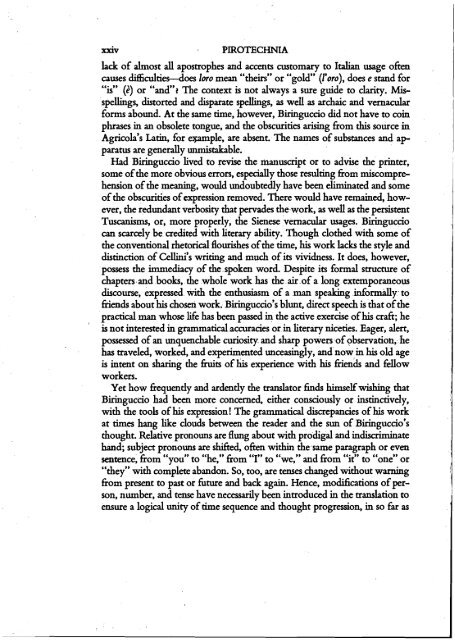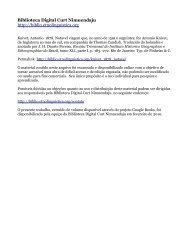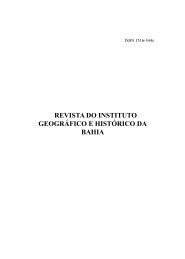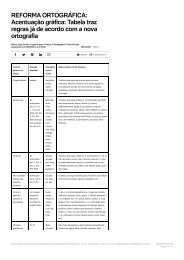Livro - Biringuccio - 09-1002-0
Artilharia os primórdios
Artilharia os primórdios
Create successful ePaper yourself
Turn your PDF publications into a flip-book with our unique Google optimized e-Paper software.
lack of almost all apostrophes and accents customary to Italian usage ofien<br />
causes &culties4oes tor0 mean "theirs" or "gold" (I'oro), does e stand for<br />
"is" (?) or "and"2 The context is not always a sure guide to clarity. Misspelhgs,<br />
distorted and disparate spellings, as well as archaic and vernacular<br />
forms abound. At the same time, however, <strong>Biringuccio</strong> did not have to coin<br />
phrases in an obsolete tongue, and the obscurities arising from this source in<br />
Agricola's Latin, for wple, are absent. The names of substances and ap<br />
paratus are generally unmistakable.<br />
Had <strong>Biringuccio</strong> lived to revise the manuscript or to advise the printer,<br />
some of the more obvious errors, especially those resulting &om miscomprehension<br />
of the meaning, would undoubtedly have been eliminated and some<br />
of the obscurities of expression removed. There would have remained, however,<br />
the redundant verbosity that pervades the work, as well as the persistent<br />
Tuscanisms, or, more properly, the Sienese vernacular usages. <strong>Biringuccio</strong><br />
can scarcely be credited with literary ability. Though clothed with some of<br />
the conventional rhetorical flourishes of the time, his work lacks the style and<br />
distinction of Cellini's writing and much of its vividness. It does, however,<br />
possess the immediacy of the spoken word. Despite its formal structure of<br />
chapters and books, the whole work has the air of a long extemporaneous<br />
discourse, expressed with the enthusiasm of a man speaking informally to<br />
&ends about his chosen work. <strong>Biringuccio</strong>'s blunt, direct speech is that of the<br />
practical man whose life has been passed in the active exercise of his crafi; he<br />
is not interested in grammatical accuracies or in literary niceties. Eager, alert,<br />
possessed of an unquenchable curiosity and sharp powers of observation, he<br />
has traveled, worked, and experimented unceasingly, and now in his old age<br />
is intent on sharing the fits of his experience with his &en& and fdow<br />
workers.<br />
Yet how frequently and ardently the translator finds himeIfwishing that<br />
<strong>Biringuccio</strong> had been more concerned, either consciously or instinctively,<br />
with the tools of his expression! The grammatical discrepancies of his work<br />
at times hang like clouds between the reader and the sun of <strong>Biringuccio</strong>'s<br />
thought. Relative pronouns are flung about with prodigal and indiscriminate<br />
hand; subject pronouns are shified, ofien within the same paragraph or even<br />
sentence, from "you" to "he," from "I" to "we," and from "it" to "one" or<br />
"they" with complete abandon. So, too, are tenses changed without warning<br />
fiom present to past or &we and back again. Hence, modifications of person,<br />
number, and tense have necessarily been introduced in the translation to<br />
ensure a logical unity of time sequence and thought progression, in so far as<br />
I<br />
I<br />
I




![[Cortar & Editat] Artigo - BOXER, C.R - Portuguese Roteiros, 1500-1700_removed](https://documents.yumpu.com/000/065/314/939/2e145b8f9d020cb1478f6bb669de4b853369b67c/6e4a3773446b6e5073444a31584c575877512f4453673d3d/79416d746a45764d6c746a757456566f3043414958413d3d.jpg?AWSAccessKeyId=AKIAICNEWSPSEKTJ5M3Q&Expires=1714395600&Signature=FqK8pgK6R2f6NofASwFP55Ohj0s%3D)
![[Capa & Editar] Artigo - BARROS, Sigrid Porto de - A](https://documents.yumpu.com/000/063/816/786/af709ce29d1c721e5f74c145faeb760c1556c101/714f48715a616a2f324a556f537178394e6b4b4f54413d3d/45394b5a5354347734556b4a575634636c39565037413d3d.jpg?AWSAccessKeyId=AKIAICNEWSPSEKTJ5M3Q&Expires=1714395600&Signature=u6URpT9Ak%2BtbUQSGlEnDRP6XU14%3D)


